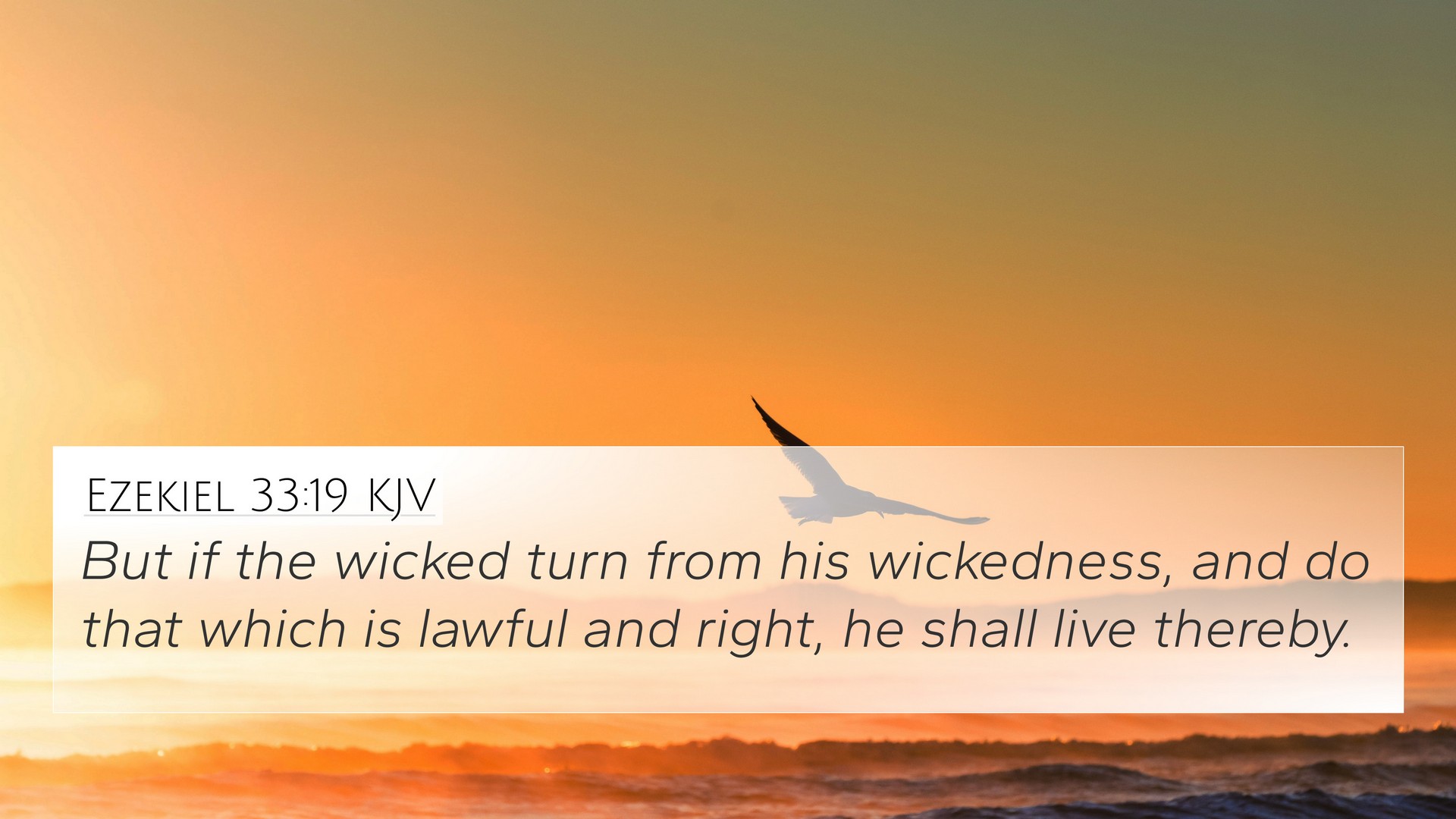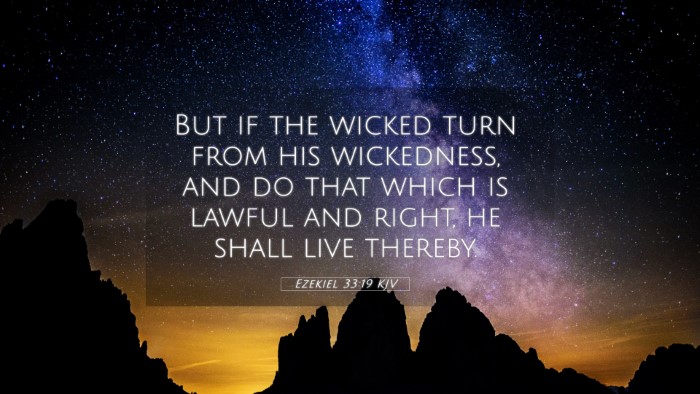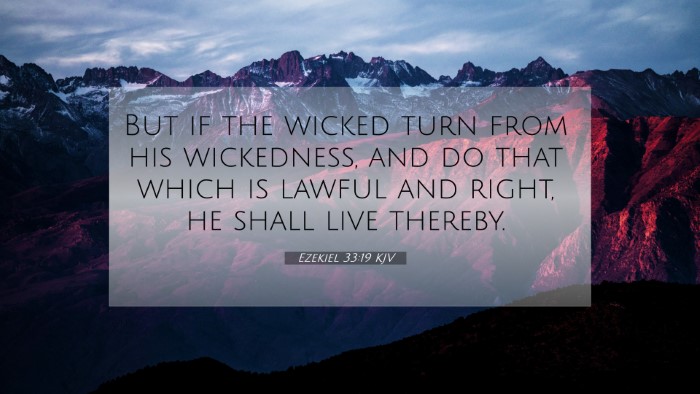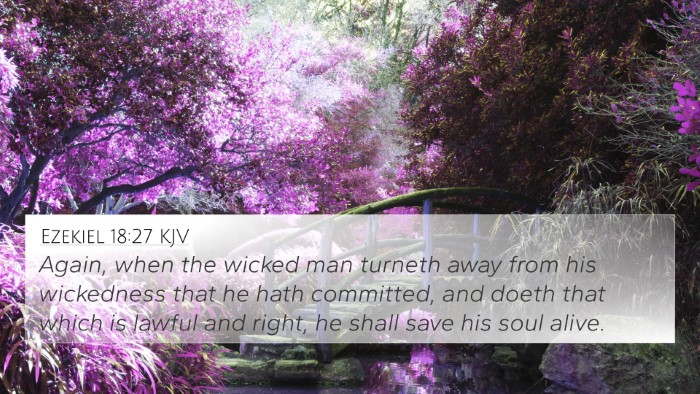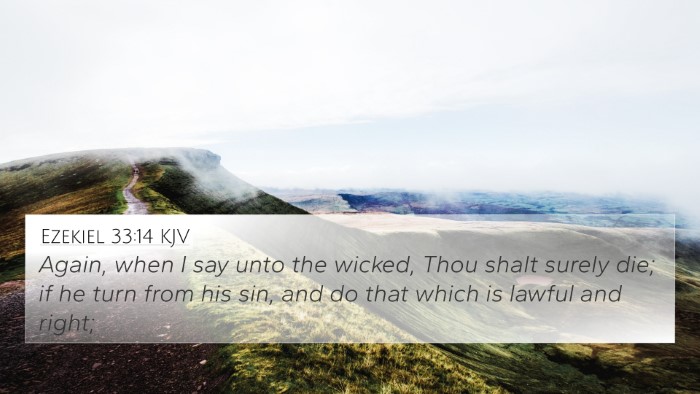Ezekiel 33:19 - Understanding the Verse
Ezekiel 33:19 states, "But if the wicked turn from his wickedness, and do that which is lawful and right, he shall live thereby." This verse emphasizes the concept of repentance and the possibility of redemption for those who have strayed from the path of righteousness. The insights from esteemed commentaries provide a rich understanding of its meaning, exploring both individual and collective responsibility in the eyes of God.
Verse Meaning
-
Matthew Henry's Commentary: Henry reflects on the profound mercy of God, highlighting how He gives the wicked a chance for repentance. This verse serves as a reminder that divine justice is paired with divine mercy. God desires that even the most wayward individuals turn from their sinful actions and embrace a life of righteousness.
-
Albert Barnes' Notes: Barnes points out the conditional nature of the promise of life in this verse. He clarifies that if the wicked genuinely turns away from sin and does what is right, he will be granted life. This reinforces the theological principle that God’s grace is contingent upon a sincere turning away from sin.
-
Adam Clarke's Commentary: Clarke elaborates on the moral responsibility of the wicked, stating that they are not predestined to hell but have the agency to make choices that lead to life. His interpretation emphasizes the importance of an active choice in the process of salvation and moral living.
Thematic Connections
This verse encapsulates several themes prevalent throughout the Bible, contributing to the broader narrative of repentance, grace, and divine justice. Understanding these themes can be enhanced by engaging in cross-referencing various scriptures that support similar ideas.
Cross References
- 2 Chronicles 7:14: "If my people, which are called by my name, shall humble themselves, and pray, and seek my face, and turn from their wicked ways; then will I hear from heaven..."
- Acts 3:19: "Repent therefore, and be converted, that your sins may be blotted out..."
- Isaiah 55:7: "Let the wicked forsake his way, and the unrighteous man his thoughts..."
- Luke 15:7: "I say unto you, that likewise joy shall be in heaven over one sinner that repenteth..."
- Ezekiel 18:30: "Therefore I will judge you, O house of Israel, everyone according to his ways, saith the Lord God. Repent, and turn yourselves from all your offenses..."
- Romans 2:4: "Or despisest thou the riches of his goodness and forbearance and longsuffering; not knowing that the goodness of God leadeth thee to repentance?"
- John 3:16: "For God so loved the world, that he gave his only begotten Son, that whosoever believeth in him should not perish, but have everlasting life."
Concept of Repentance
The core message of Ezekiel 33:19 is the transformative power of repentance. Repentance is not just feeling remorse but involves a decisive change in behavior that aligns with God’s law. It opens the path to renewal and life, reaffirming the belief in a restorative relationship with God.
Comparative Analysis
This verse invites a comparative study of the Old Testament's call for repentance and the New Testament's declaration of grace. It underscores a continuous dialogue in scripture that emphasizes personal responsibility and the hope of redemption.
Practical Applications
For those studying the Bible, Ezekiel 33:19 serves as a pivotal verse for understanding God's expectation of personal accountability. It encourages believers to actively engage in self-reflection and repentance, knowing that turning away from sin leads to life.
Tools for Bible cross-referencing can help believers make connections between verses like Ezekiel 33:19 and other related scriptures. Familiarity with a Bible concordance or a cross-reference guide allows deeper exploration of biblical themes and encourages thematic Bible verse connections.
Conclusion
In conclusion, Ezekiel 33:19 stands as a profound reminder of the grace available to all who choose to repent. The insights from various biblical commentaries enrich our understanding of this verse, allowing believers to appreciate the depths of God's mercy and the call to righteousness.
